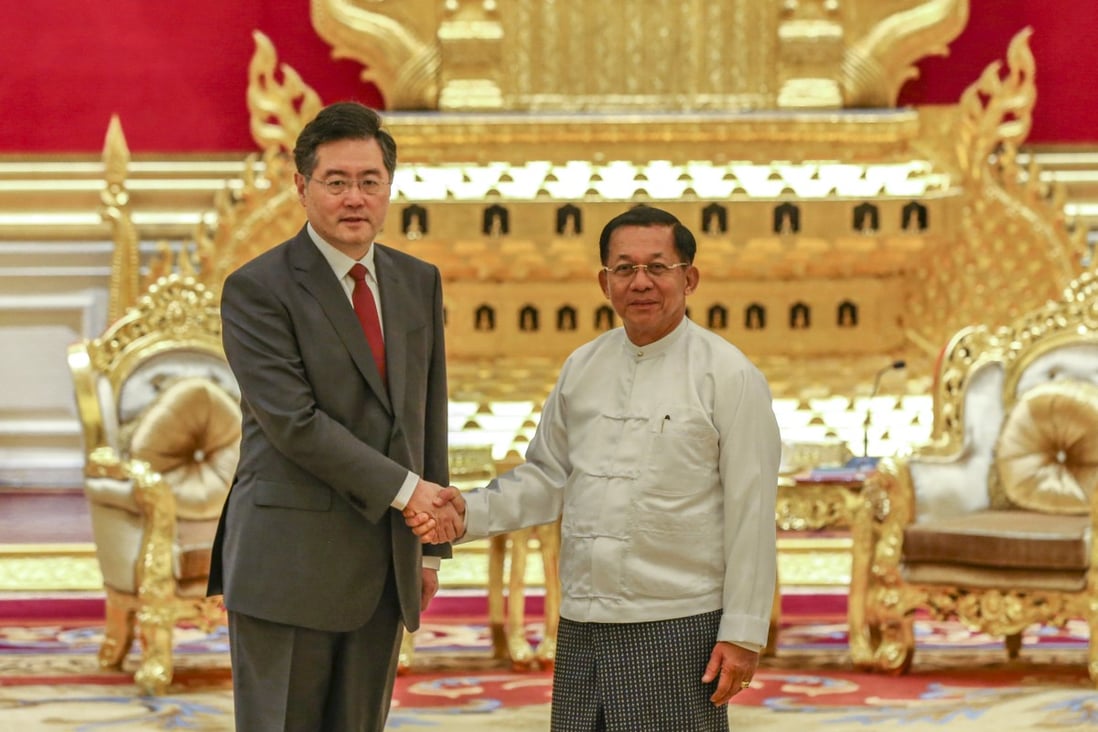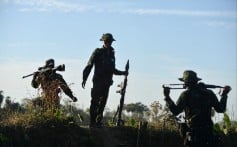STALINIST FETISH FOR MILITARIST REGIMES
China’s Qin Gang pledges economic help for Myanmar, stops short of recognising juntaDuring rare visit, the Chinese foreign minister meets Myanmar’s junta leader, the most senior official to do so since a military coup
But amid international condemnation of regime, analysts say Beijing has not officially recognised it
Shi Jiangtao
Published: 3 May, 2023

During a rare high-level visit, Chinese Foreign Minister Qin Gang meets Myanmar’s junta leader, Min Aung Hlaing, in Naypyidaw on Tuesday. Photo: Xinhua
In a rare visit to Myanmar, Chinese Foreign Minister Qin Gang has called for stability in the troubled country and urged the international community to respect its sovereignty and help push for peace and reconciliation.
Qin praised China’s “good-neighbourly relations” with Myanmar during a meeting with the country’s junta chief on Tuesday, promising economic help on key infrastructure deals and other projects and pledging to “build a community of a shared future” between the two neighbours.
Qin’s visit, and his meeting with Senior General Min Aung Hlaing in particular – making him the highest-ranking Chinese official to do so since a coup in February 2021 – signalled Beijing’s warming ties with the military regime.
But Chinese analysts said the visit should not be interpreted as Beijing’s official recognition of Myanmar’s junta, as China remained ambivalent towards the military-ruled government and its ability to control the country amid international condemnation of the coup and the ensuing conflict.
According to an official readout by China’s foreign ministry, Qin described the two countries as “brothers who share the same mountain and water”, and said China was ready to promote the comprehensive strategic cooperation promised by President Xi Jinping during a 2020 state visit.
“China sincerely hopes for Myanmar’s stability and development, supports Myanmar in exploring its development path that is in line with its national conditions and with Myanmar’s characteristics,” Qin was quoted as saying.
He also pledged Beijing’s support for Myanmar’s pursuit of political transformation and efforts by all relevant parties to “properly settle their differences and seek national reconciliation under the constitutional and legal framework”.
“China advocates that the international community respect Myanmar’s sovereignty and play a constructive role for Myanmar to achieve peace and reconciliation,” Qin said.
China would continue to “provide help to Myanmar’s development within its capabilities”, speed up investment linked to the China-Myanmar Economic Corridor, and implement projects in agriculture, education and healthcare, Qin told his host.
The Chinese readout did not include a quote from Qin in a Burmese-language statement from the junta’s information team that said China “stands with Myanmar on the international stage”, according to Agence France-Presse.
Qin’s predecessor, Wang Yi, visited Myanmar in July last year to co-chair a regional gathering of foreign ministers of the Lancang-Mekong Cooperation mechanism, but he failed to secure a meeting with Min Aung Hlaing.
China has refused to condemn the military takeover and remains a major ally and arms supplier of the internationally isolated junta in the wake of Western sanctions.
Beijing’s previous pledges to help safeguard Myanmar’s sovereignty, independence and territorial integrity “no matter how the situation changes” have been widely criticised by Myanmar’s armed opposition as tacit support for the military rulers.
Asean presses Myanmar to end violence after 100 killed in air strike
13 Apr 2023

The junta’s dependence on Beijing has increased – China is Myanmar’s largest trading partner and its second-largest foreign investor after Singapore since the country’s democratically elected government was toppled.
According to a report last month by the UK-based Energy Intelligence, a Myanmar pipeline connected to a refinery in Kunming has become a new route for sanctioned Russian exporters to deliver crude oil to China in the wake of the Ukraine war. A total of 3 million barrels of crude oil have been shipped to China from a deep seaport in Myanmar’s Rakhine state since February, said the report citing local port data.
Since the coup, Chinese factories and projects have been specifically targeted by armed resistance groups in Myanmar.
Before his visit to Myanmar’s capital Naypyidaw, Qin painted a grim picture of the Myanmar issue during a meeting with Noeleen Heyzer, special envoy for the United Nations secretary general on Myanmar on Monday, and warned against a “spillover” of the country’s escalating violence. “With internal and external factors intertwined, the Myanmar issue is complex and has no ‘quick fix’,” he said according to his ministry.
In a message to Myanmar’s junta regime during an inspection tour of the frontier province of Yunnan on Tuesday, Qin said it was important to maintain stable borders with Myanmar and “severely” crack down on cross-border criminal activities.
During their meeting hours later, Min Aung Hlaing hailed China’s “objective and impartial stance” on Myanmar-related issues and pledged that Myanmar would work to ensure the safety of Chinese citizens and institutions in the country.
Myanmar was “willing to cooperate with China to maintain tranquillity in the border areas of the two countries”, he was quoted as saying in the Chinese readout.
Xu Liping, director of the Centre for Southeast Asian Studies at the Chinese Academy of Social Sciences, said Qin’s visit was mainly about maintaining peace and stability along the China-Myanmar border.
Top election official shot dead in Myanmar
22 Apr 2023

“It is in China’s interests to engage with Myanmar’s military regime, but this kind of dialogue does not mean China supports the junta, nor does it imply any change in China’s stance on the Myanmar issue,” Xu said.
He said Beijing was concerned about the instability in Myanmar, especially near the border areas, with rampant cross-border crime, such as telecoms fraud and human trafficking in northern Myanmar, reportedly targeting Chinese nationals.
“The trip was aimed at enhancing communication and coordination with the Myanmar authorities on issues such as stability along the China-Myanmar border and combating transnational crime, which directly affect China’s security interests,” he said.
In recent months, China has increased its engagement with the junta. China’s special envoy for Asian affairs Deng Xijun has met Min Aung Hlaing at least twice since December.
Deng also held separate meetings with leaders of ethnic armed groups in the north, particularly in Shan and Kachin states bordering Yunnan province.
Deng also chaired a meeting in Kunming last month between the junta representatives and Bangladesh’s foreign secretary, Masud Bin Momen, as Beijing sought to help both sides repair ties and repatriate Rohingya refugees to Rakhine state from Bangladesh.
Yunnan’s Communist Party boss Wang Ning and Peng Xiubin, a senior official at the International Liaison Department, also visited Myanmar last month. According to the Irrawaddy news portal, Wang also met Min Aung Hlaing, but his request to meet imprisoned former state counsellor Aung San Suu Kyi was denied.
Despite the warming ties with Myanmar’s military regime, Xu said Beijing still had reservations about officially recognising the junta.
“China has not explicitly recognised Myanmar’s military government in public so far. Instead, Beijing has tried to forge normal relations between the two countries, regardless of who is in power,” he said.
But Xu cautioned that it would not be in China’s interest to expand investment or economic cooperation with Myanmar because of security concerns and anti-Chinese sentiment in the Southeast Asian nation.
“Since the coup, investment projects have been largely suspended and the instability has dealt a heavy blow to economic and trade relations between China and Myanmar,” he said.
Xu said China – which has had to endure Myanmar’s protracted instability and violence – would continue to help the Association of Southeast Asian Nations (Asean) mediate Myanmar’s peace and transformation process.
However, Asean has remained divided over Myanmar, which many have seen as a sign of weakness in the regional bloc’s ability to tackle such a regional crisis on its doorstep.
“There’s a consensus among many countries in the region, including China, that it would be unrealistic to find solutions to the Myanmar issue without engaging the military,” Xu said.

Shi Jiangtao
A former diplomat, Shi Jiangtao has worked as a China reporter at the Post for more than a decade. He's interested in political, social and environmental development in China.
No comments:
Post a Comment